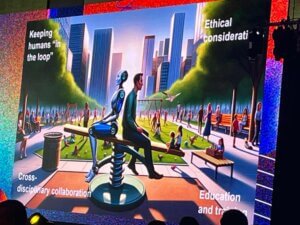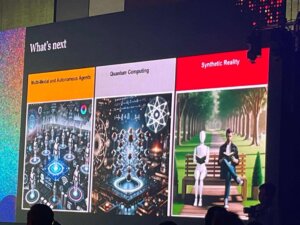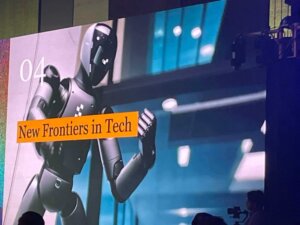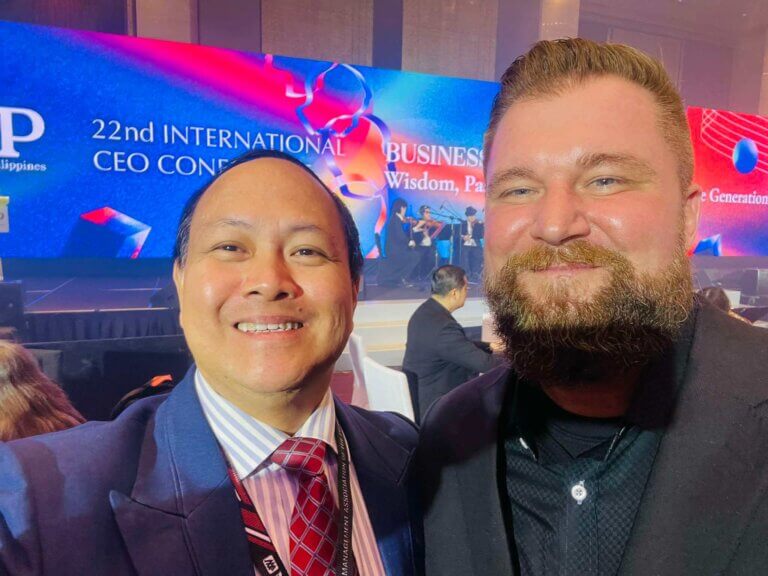In an era of rapid technological advancement, the conversation surrounding Generative AI has never been more critical. Scott Likens, the Global AI and Innovation Technology Leader at PwC USA, recently highlighted the transformative potential of this technology during his speech at the Management Association of the Philippines 22nd International CEO Conference. His insights shed light on how Generative AI will redefine communication, workforce dynamics, and future generations.
The Power of Generative AI in Breaking Barriers
Generative AI, which allows seamless communication across languages, serves as a testament to the power of technology in breaking barriers. To demonstrate the language learning capabilities of AI, Likens showed a video featuring his digital twin, a likeness that was able to speak Tagalog using his voice. It was astounding!
As Likens notes, while current AI tools may not achieve perfect proficiency, they facilitate the exchange of ideas and information, an essential aspect for leaders to consider regarding their workforce, customers, and, importantly, the upcoming Generation Alpha. Likens poses a thought-provoking question: Will we soon welcome a “Generation AI,” where machines adapt more fluidly to our environments and needs? It’s a notion that challenges traditional paradigms and invites leaders to contemplate a future shaped significantly by innovation.

AI’s Rapid Evolution and Impact on Society
In his speech, Likens highlighted that while artificial intelligence has a rich history spanning over 70 years, the past two years have witnessed unprecedented rapid development, particularly in Generative AI applications. From simple programmatic tasks to complex problem-solving capabilities, AI has evolved dramatically. This evolution is not just about speed; it represents a fundamental shift in how businesses and individuals engage with technology. The acceleration in adoption—100 million users in a fraction of the time it took for past technologies—illustrates society’s readiness to embrace these innovations.
Inclusive Adoption Across Generations
As we look toward the future of work, Likens emphasized the importance of inclusive technology adoption across all generations currently in the workplace. Generative AI offers tools that democratize access to complex analytics and insights, enabling individuals from various backgrounds to harness its capabilities. This is particularly significant as organizations strive to engage with customers in more meaningful ways. By empathizing with diverse customer needs through language and data, businesses can create a more connected experience that reflects an understanding of the human element in service.

The Challenges of an AI-Driven Future
However, the transition to an AI-driven future is not without its challenges. Likens cautions that alongside these advancements come significant risks, including cybersecurity threats and operational complexities. Leaders must proactively manage these risks while ensuring that their workforce is prepared for technological integration. Upskilling and reskilling employees will be crucial, as will fostering a culture that embraces innovation responsibly.
Beyond immediate considerations, the speech also touched upon the potential for future technologies like quantum computing and neural networks, which promise to amplify the power of AI even further. Such technologies may enable solutions to formerly insurmountable problems, ushering in a new era of productivity and creativity.
The Business Case for AI Investment
According to PwC’s Global CEO Survey 2024, 70% of CEOs expect AI to significantly change their business models. AI will be one of the biggest investment opportunities of this decade, with companies currently seeing up to 13% ROI, a figure that is expected to rise as the AI industry grows.
Likens highlighted the Essential Eight Emerging Technologies that business leaders can focus on for Generative AI deployments to accelerate business value creation:
- Artificial Intelligence (AI)
- Internet of Things (IoT)
- Blockchain
- Augmented Reality (AR)
- Virtual Reality (VR)
- Advanced Robotics
- Quantum Computing
- Neuromorphic Computing

Still, according to Likens, convergence among the Essential Eight is inevitable, real, and accelerating. These technologies can be powerful when deployed responsibly. Looking ahead, the convergence of Generative AI with other advancements presents myriad possibilities. Likens urges leaders to rethink their strategic approach, integrating AI into the core of business development rather than treating it as an auxiliary tool. This integration can enhance not only operational efficiency but also the overall quality of products and services.
Navigating an AI-Driven Future: A Call for Responsible Innovation
As we navigate this evolving landscape, one key takeaway from Likens’ message is clear: the pace of change is only accelerating. Organizations that proactively embrace these innovations, upskill their workforce, and acknowledge the human element in technology will position themselves to thrive in what is undeniably an AI-driven future. The challenge lies not in resisting change but in leveraging it to unlock new potential for our businesses and communities—a path that requires collaboration, foresight, and a commitment to responsible innovation.
The emergence of Generative AI heralds a transformative journey in how we communicate, work, and prepare for future generations. As leaders, it is our responsibility to ensure that we harness these advancements ethically and effectively, paving the way for a flourishing synthesis of technology and human creativity.
Explore More AI Insights
We have other interesting articles about the evolving role of AI and its impact on industries. Visit our blog to read more and stay informed about the latest developments in technology and innovation.





